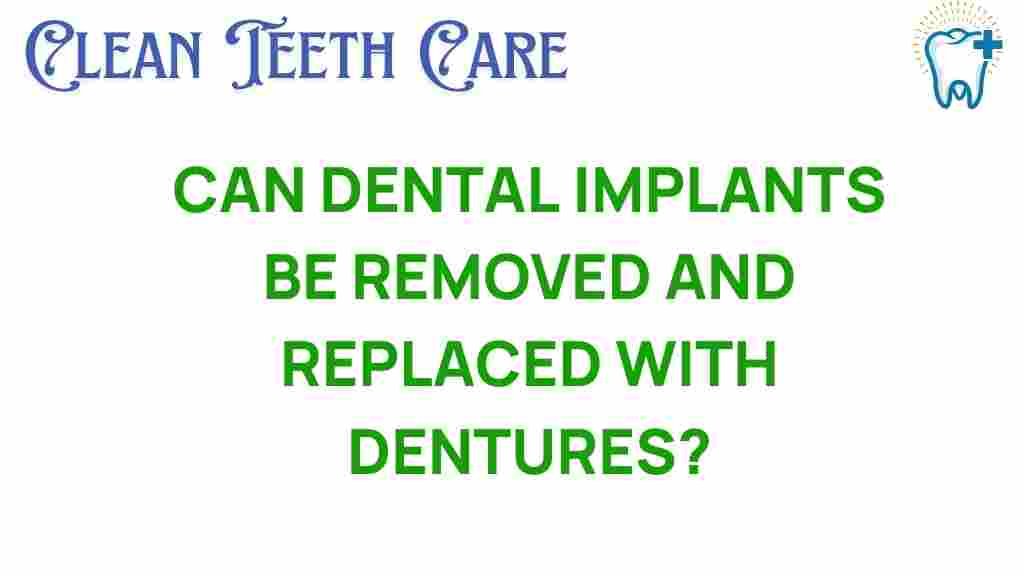The Surprising Truth: Can Dental Implants Be Swapped for Dentures?
When it comes to tooth replacement, patients often find themselves weighing the pros and cons of dental implants versus dentures. Both options serve the purpose of restoring oral functionality and improving aesthetics, but they each come with unique benefits, maintenance requirements, and implications for oral health. In this article, we’ll explore whether dental implants can be swapped for dentures, providing you with valuable insights into dental care and restorative dentistry.
Understanding Dental Implants and Dentures
Before we dive into the comparison, let’s clarify what dental implants and dentures are.
- Dental Implants: These are titanium posts surgically inserted into the jawbone, acting as artificial tooth roots. Once healed, they can support crowns, bridges, or even full arch restorations.
- Dentures: These are removable prosthetic devices that replace missing teeth and surrounding tissues. They can be complete (replacing all teeth) or partial (replacing some teeth) and are typically held in place by suction or adhesives.
Comparing Dental Implants and Dentures
Both dental implants and dentures have their merits, and the choice between them largely depends on individual circumstances, preferences, and oral health conditions. Here’s a comparison based on various factors:
- Longevity: Dental implants are designed to last a lifetime with proper care, while dentures may need to be replaced every 5-10 years.
- Functionality: Implants function like natural teeth, allowing for normal chewing and speaking. Dentures can sometimes shift, causing discomfort.
- Maintenance: Dental implants require regular dental check-ups and good oral hygiene. Dentures need to be removed, cleaned, and sometimes relined.
- Cost: While implants may have a higher upfront cost, their longevity can make them more cost-effective over time compared to dentures.
The Process of Swapping Dental Implants for Dentures
If you’re considering making the switch from dental implants to dentures, or vice versa, understanding the process is crucial:
Step 1: Consultation with a Dental Professional
The first step is to consult with a qualified dental professional who specializes in restorative dentistry. They will evaluate your oral health, discuss your reasons for wanting to switch, and provide options based on your specific situation.
Step 2: Treatment Planning
Your dentist will create a treatment plan tailored to your needs. This may involve:
- Assessing the condition of your oral health
- Considering any periodontal issues
- Determining the best type of denture for your situation
Step 3: Implant Removal (if applicable)
If you currently have dental implants and need them removed, your dentist will perform an implant removal procedure. This involves:
- Administering anesthesia for comfort
- Carefully extracting the implant from the jawbone
- Ensuring the site is healed before proceeding with dentures
Step 4: Fitting for Dentures
Once the implants have been removed and the site has healed, your dentist will take impressions of your mouth to create custom dentures. This process involves:
- Taking precise measurements and molds
- Choosing the right shade and shape of the artificial teeth
- Creating a wax model for you to try before the final product is made
Step 5: Final Fitting and Adjustment
After your dentures are created, a final fitting will occur. Your dentist will ensure they fit comfortably and securely. Any necessary adjustments will be made during this appointment.
Troubleshooting Tips
Switching from dental implants to dentures may come with challenges. Here are some troubleshooting tips:
- Discomfort or Soreness: It’s common to experience some discomfort while adjusting to new dentures. Use over-the-counter pain relievers as needed, and consult your dentist for adjustments.
- Fit Issues: If your dentures feel loose or uncomfortable, adjustments may be necessary. Don’t hesitate to reach out to your dental care provider.
- Difficulty Eating or Speaking: Practice speaking and eating with your dentures at home. It may take time to become accustomed to them.
Conclusion
In conclusion, the decision to swap dental implants for dentures is a significant one that should be made in consultation with your dental care provider. Both options have unique advantages and disadvantages, and understanding these can help you make an informed choice that aligns with your oral health needs and lifestyle.
Whether you opt for dentures or dental implants, maintaining good dental care practices is essential. Regular check-ups, cleanings, and following your dentist’s advice will ensure your new restoration serves you well for years to come.
For more information on dental procedures and options available for tooth replacement, check out this dental care resource. If you have specific questions about your situation, don’t hesitate to reach out to a local dental professional.
This article is in the category Treatments and created by CleanTeethCare Team
